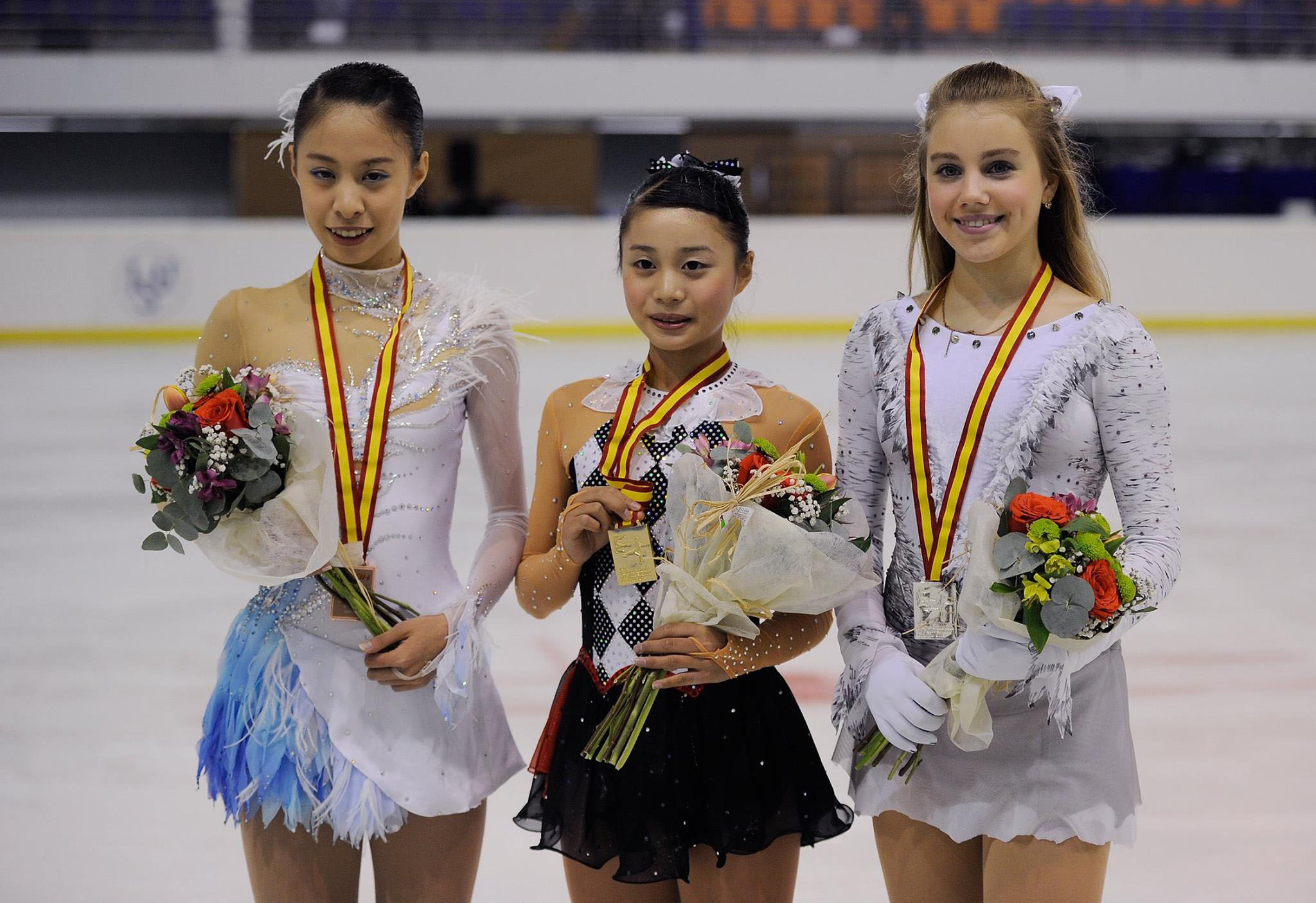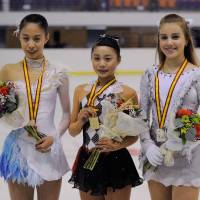"So sophisticated, so sensitive, so young, so incredible."
Yuna Shiraiwa received high praise after her free skate from announcer Ted Barton on the International Skating Union's broadcast of the Junior Grand Prix in Logrono, Spain, on Friday night.
Shiraiwa made history there when she came from behind to capture her second JGP title of the season with a near-flawless performance. Third after Thursday's short program, Shiraiwa overtook Russia's Alisa Fedichkina (who was in first place) and compatriot Yura Matsuda (who was in second) for the victory.
Fedichkina had to settle for second, while Matsuda took third.
What Shiraiwa accomplished is no small achievement. By winning the first two JGP's of her career she became just the third Japanese female to pull off the feat.
The other two?
Mao Asada and Miki Ando.
Not bad company for the 13-year-old from Kyoto.
Mao and Ando both went on to become world junior champions and then won multiple world titles in the senior ranks.
Just to give it even more context, not even Yuna Kim won her first two JGP events.
Shiraiwa has literally vaulted out of anonymity into the spotlight. At the Japan Junior Championships last November she finished 27th and did not even qualify to take part in the free skate.
Now she has people asking who she is.
A young talent with great potential is the answer to that question.
As she left the ice to receive her scores on Friday, Barton was glowing, saying, "It was perfect tonight. . . . It leaves you kind of speechless. An amazing talent."
Worth noting is that Shiraiwa, who won her debut JGP in Colorado Springs last month, scored more than 22 points higher than in her first triumph. Her total score in Spain was 186.80, which is the highest ever for a Japanese junior female and the eighth-highest in ISU junior history.
The top seven scores are held exclusively by Russian skaters.
Perhaps even more significant is that Shiraiwa's program component score of 68.12 for her free skate was higher than that of any of the senior women at last season's world championships in Shanghai.
Shiraiwa's tally bested that of senior world champion Elizaveta Tuktamysheva (who recorded 63.08 in her winning free skate) by more than five points.
Competing to "Night Waltz" and "Send in the Clowns" in her free skate, Shiraiwa opened with two triple-triple combinations (a triple lutz/triple toe loop and a triple salchow/triple loop) and landed seven triple jumps in all. She also received three level-fours for her spins.
Shiraiwa was composed from beginning to end in her free skate, taking a few deep breaths before she began a performance to remember. She broke into a bright smile when she finished.
There was a classic moment when Shiraiwa came off the ice. There were no tears or tissues and she was not greeted with a hug by coach Yamato Tamura, but rather a slap on the back.
Shiraiwa is now set for the Junior Grand Prix Final in Barcelona, Spain, in December where she will be joined by teammate Mai Mihara. Shiraiwa will first try to improve on that 27th-place finish at last year's Japan juniors when she takes the ice next month in Ibaraki.
With Shiraiwa, Mihara and Wakaba Higuchi all participating, that should be quite an event.
New beginning: Mao made her competitive return on Saturday at the invitational Japan Open in Saitama and won the women's part of the event which comprised only the free skate. It had been 553 days since she last took part in an event that counted, which was at the same Saitama Super Arena where she won her third world title back in March 2014.
With Mao leading the way, Team Japan, defeated Team Europe and Team North America to claim the title. Mao performed to "Madame Butterfly" and looked radiant in a purple outfit before a sellout crowd of more than 18,000 fans.
Mao was joined on the Japan squad by reigning national champion Satoko Miyahara, Shoma Uno and Daisuke Murakami. Mao topped the six skaters in the women's category with a total of 141.70 for her free skate, beating out both Tuktamysheva (128.34) and Olympic champion Adelina Sotnikova (118.81) in the process.
Miyahara came in second with a tally of 134.67.
Uno led the men's field with 185.48 for a solid win over world champion Javier Fernandez (176.24).
Mao, who turned 25 two weeks ago, opened with a triple axel and was from composed from start to finish. Now likely to be the "veteran" in any event she enters, Mao performed like it on Saturday night.
"It was my first competition after such a long time," Mao was quoted as saying by icenetwork.com. "I was glad that I managed to control my feelings and skate well."
It's a small sample size, but a very encouraging restart to Mao's illustrious career.




